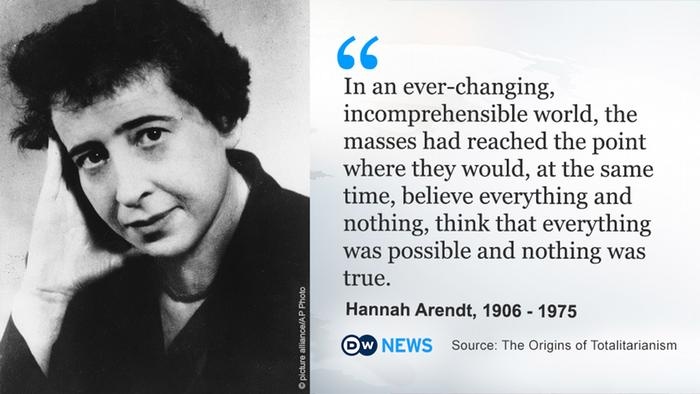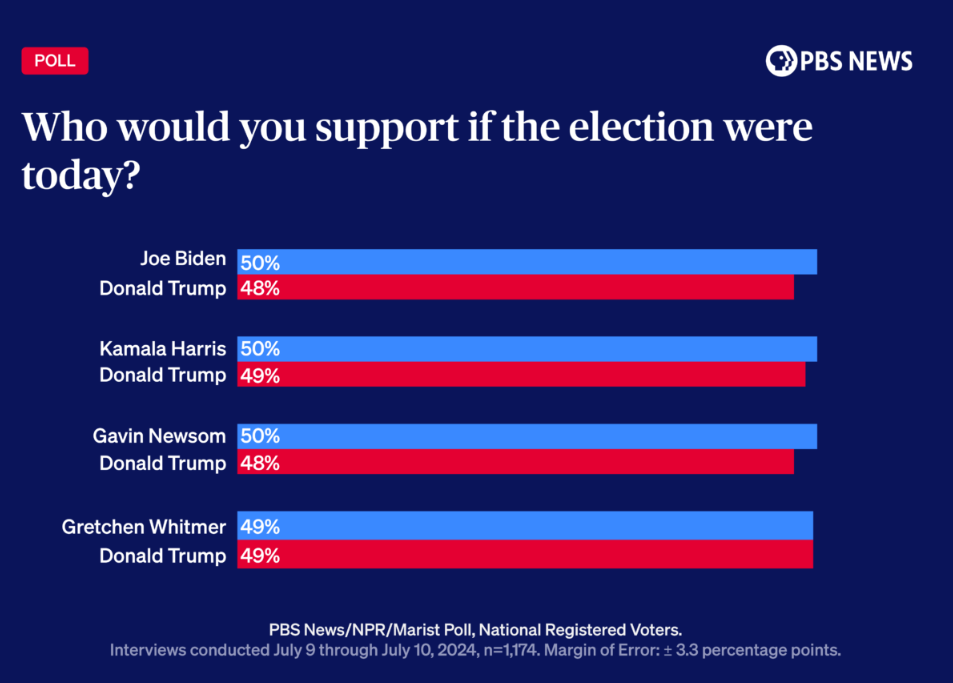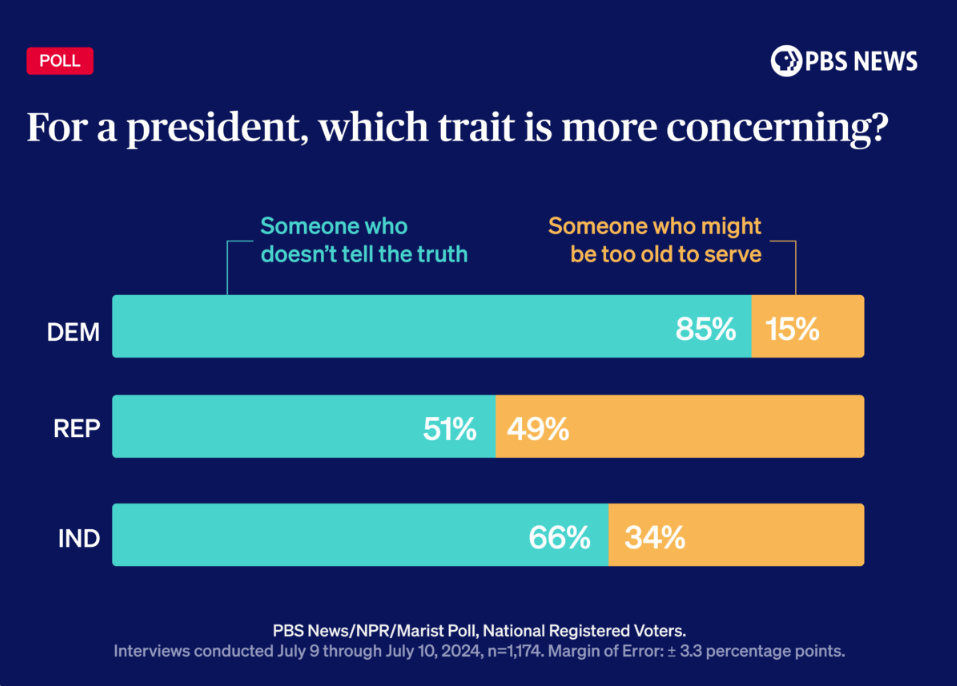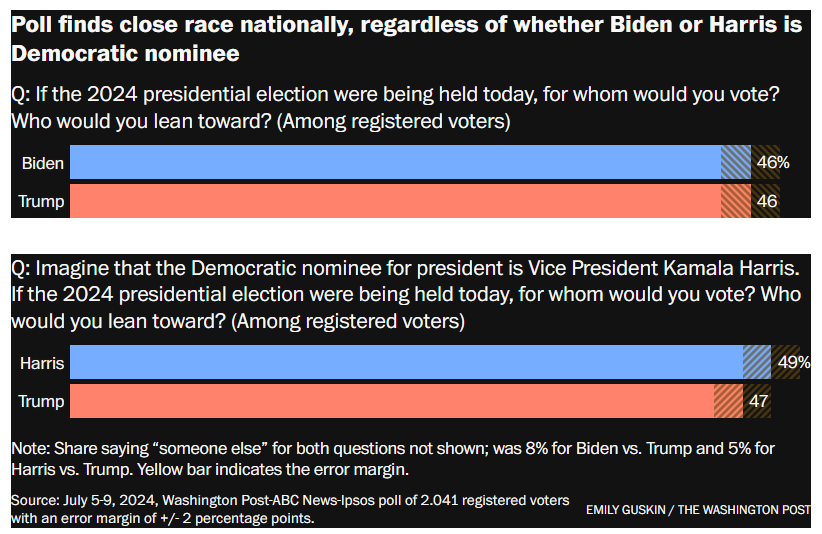Pragmatic politics focused on the public interest for those uncomfortable with America's two-party system and its way of doing politics. Considering the interface of politics with psychology, cognitive science, social behavior, morality and history.
Etiquette
Sunday, July 14, 2024
About the incident in Pennsylvania
Saturday, July 13, 2024
Unexplored major issues in politics: About chronic liars
That data struck me as something new, since I could not find or recall poll data that hinted at the possibility that chronic lying by a politician or demagogue could be a significant factor in a voter's choice of candidate. My recollection was that in 2016 when chronic lying by DJT became apparent to me I was shocked that it did not seem to faze anyone I came across. No one seemed to think it was important, while in my mind it was as important as the obvious authoritarianism that I thought DJT was exhibiting at the time. I recall citing this Politifact data in 2016 in several posts and/or comments:
I got two reactions to that data in 2016 and my argument that DJT was an astonishing chronic liar. One was from people who opposed or were neutral to DJT. They dismissed the data with a blithe, "all politicians lie" response. They ignored my "but look at the data" argument. They just shrugged it off.
While many voters express a preference for honesty, the strategic use of lies by politicians and the complex media environment can lead to a greater tolerance for dishonesty. This dynamic has significant implications for public trust and the ethical standards of political discourse.
Politicians are motivated by the desire to build a positive reputation, therefore they will be more likely to deliver false statements (incurring the risk of being fact-checked) when the potential benefit outweighs the cost. This happens as new elections come closer, since the electoral benefit of falsehoods increases along with the probability of being checked too late (after the election day). Politicians are less likely to issue falsehoods in detailed statements and in scripted communication, since the reputational cost are higher because such falsehoods would be considered intentional.
Is there any evidence that I am not just a lone crackpot in thinking that the data suggesting that being a chronic liar might be, just might be, something more important than the standard all politicians lie standard for acceptable veracity in American society? Maybe. I found this today, talking about the same data I got jazzed about yesterday:
One possible reason the polls haven’t moved as much as pundits expected: Voters still don’t like or trust TrumpA new Marist poll takes the novel step of asking registered voters which is more off-putting in an occupant of the Oval Office: dishonesty or excessive age. The results are surprising, and along with other polling along these lines, it should influence how Joe Biden’s and Donald Trump’s relative qualifications for the presidency are covered from here on out.
The poll asked: Which is more concerning in a president, someone who doesn’t tell the truth, or someone who might be too old to serve? The results were lopsided: By 68 to 32 percent, respondents were more concerned about the lying than the aging. Given the relentless media focus on presidential age of late, that’s simply remarkable.
While the poll doesn’t directly compare Trump and Biden on that particular question, it also finds that 52 percent of Americans say Biden has the “character to serve as president,” whereas only 43 percent say this about Trump. Fifty-six percent say Trump lacks the character to serve, which surely reflects public perceptions of Trump’s dishonesty.
The new Marist poll, by the way, also shows Biden leading Trump by 50 to 48 percent. But that’s out of sync with polling averages, so we should be cautious about that finding. Still, even if the overall poll is off by a few points, the numbers on dishonesty and age remain striking.
Trump was probably the most dishonest president in U.S. history. His lies and distortions topped 30,000 during his presidency, according to The Washington Post. That has continued unabated: CNN fact-checker Daniel Dale tallied up over 30 lies from Trump at the recent presidential debate, while Biden’s falsehoods amounted to maybe a third of that. Critically, many of Trump’s whoppers were far more gargantuan lies—such as the claim that Democratic states execute babies—leading Dale to describe Trump’s lying as “staggering.”
What the new Marist poll adds to this debate is the idea that voters see excessive lying as a serious problem in a president. Yet ask yourself this: How often is Trump’s lying covered that way? Trump’s dishonesty is rarely treated as a sign of his temperamental unfitness for the presidency. Biden’s age, of course, is constantly covered as an important factor in determining his fitness for the office. Biden’s age should be covered this way, to be clear. But so should Trump’s relentless lying.
The key distinction here is between mental unfitness for the presidency (where Biden does very badly, relative to Trump), and temperamental unfitness for that majestic office. On the latter, Quinnipiac found earlier this year Biden does significantly better than Trump does, with an extraordinary 61 percent saying Trump is temperamentally unfit for the presidency.
Friday, July 12, 2024
Another poll
Which is more important? Saving your conscience or saving democracy?
We all (or most of us) have thresholds for what we will or won’t do. It’s called “personal ethics.” For example, as a 55+year vegetarian, I’d say nothing could make me eat animal flesh.
Supposing someone holds a gun to your head and says “Do X or I pull the trigger.” Will you do X? You may say “no” when not faced with that prospect for real, but I guarandamntee you that if it was a reality, you’d say, “How high should I jump?” Or, in my case, “Give me that fucking hamburger,” and I’d gag it down somehow. IOW, you will do X no matter how disgusting you find it. Self-preservation runs THAT deep.
There is a political gun pointed at our collective “high moral standards” heads this November. Will you help the perpetrators pull the trigger, out of your prioritized conscience? Will you choose your conscience over democracy?
For you third party or write-in voters, that’s what this November election comes down to. Your vote for Stein, or RFK, Jr., or Mickey Mouse is just a wasted vote. That is a cold hard objective fact.
BUT… your conscience will be clear. It, your conscience, helped enable/catapult a psychopathic madman into the leader of the “no longer free as we’ve known it” U.S. world. (see Project 2025)
Am I wrong about this? Do you still plan to vote third party or write in?
Make your case in view of my scenario. Tell me why I’m not seeing clearly?
(by PrimalSoup)
Thursday, July 11, 2024
The NYT editorial board calls DJT unfit
OPINIONDONALD TRUMP IS UNFITTO LEADBY THE EDITORIAL BOARD
The editorial board is a group of opinion journalists whose views are informed by expertise, research, debate and certain longstanding values. It is separate from the newsroom.
Next week, for the third time in eight years, Donald Trump will be nominated as the Republican Party’s candidate for president of the United States. A once great political party now serves the interests of one man, a man as demonstrably unsuited for the office of president as any to run in the long history of the Republic, a man whose values, temperament, ideas and language are directly opposed to so much of what has made this country great.
It is a chilling choice against this national moment. For more than two decades, large majorities of Americans have said they are dissatisfied with the direction of the country, and the post-Covid era of stubborn inflation, high interest rates, social division and political stagnation has left many voters even more frustrated and despondent.The Republican Party once pursued electoral power in service to solutions for such problems, to building “the shining city on a hill,” as Ronald Reagan liked to say. Its vision of the United States — embodied in principled public servants like George H.W. Bush, John McCain and Mitt Romney — was rooted in the values of freedom, sacrifice, individual responsibility and the common good. The party’s conception of those values was reflected in its longstanding conservative policy agenda, and today many Republicans set aside their concerns about Mr. Trump because of his positions on immigration, trade and taxes. But the stakes of this election are not fundamentally about policy disagreements. The stakes are more foundational: what qualities matter most in America’s president and commander in chief.
Mr. Trump has shown a character unworthy of the responsibilities of the presidency. He has demonstrated an utter lack of respect for the Constitution, the rule of law and the American people. Instead of a cogent vision for the country’s future, Mr. Trump is animated by a thirst for political power: to use the levers of government to advance his interests, satisfy his impulses and exact retribution against those who he thinks have wronged him.
He is, quite simply, unfit to lead.The Democrats are rightly engaged in their own debate about whether President Biden is the right person to carry the party’s nomination into the election, given widespread concerns among voters about his age-related fitness. This debate is so intense because of legitimate concerns that Mr. Trump may present a danger to the country, its strength, security and national character — and that a compelling Democratic alternative is the only thing that would prevent his return to power. It is a national tragedy that the Republicans have failed to have a similar debate about the manifest moral and temperamental unfitness of their standard-bearer, instead setting aside their longstanding values, closing ranks and choosing to overlook what those who worked most closely with the former president have described as his systematic dishonesty, corruption, cruelty and incompetence.
That task now falls to the American people. We urge voters to see the dangers of a second Trump term clearly and to reject it. The stakes and significance of the presidency demand a person who has essential qualities and values to earn our trust, and on each one, Donald Trump fails.
The danger from these foundational failings — of morals and character, of principled leadership and rhetorical excess — is never clearer than in Mr. Trump’s disregard for rule of law, his willingness to do long-term damage to the integrity of America’s systems for short-term personal gain.As we’ve noted, Mr. Trump’s disregard for democracy was most evident in his attempts to overturn the results of the 2020 election and to encourage violence to stop the peaceful transfer of power. What stood in his way were the many patriotic Americans, at every level of government, who rejected his efforts to bully them into complying with his demands to change election results. Instead, they followed the rules and followed the law. This respect for the rule of law, not the rule of men, is what has allowed American democracy to survive for more than 200 years.In the four years since losing the election, Mr. Trump has become only more determined to subvert the rule of law, because his whole theory of Trumpism boils down to doing whatever he wants without consequence. Americans are seeing this unfold as Mr. Trump attempts to fight off numerous criminal charges. Not content to work within the law to defend himself, he is instead turning to sympathetic judges — including two Supreme Court justices with apparent conflicts over the 2020 election and Jan. 6-related litigation. The playbook: delay federal prosecution until he can win election and end those legal cases. His vision of government is one that does what he wants, rather than a government that operates according to the rule of law as prescribed by the Constitution, the courts and Congress.
A poll about the two candidates
Most Democrats nationwide say that President Biden should end his reelection campaign based on his performance in the presidential debate two weeks ago, according to a Washington Post-ABC News-Ipsos poll.The poll results contradict Biden’s claim that only party elites want him to step aside. He has said that positive interactions with supporters on the campaign trail have helped persuade him to stay in the race after a debate in which he trailed off and occasionally appeared confused. But the poll finds that 56 percent of Democrats say that he should end his candidacy, while 42 percent say he should continue to seek reelection. Overall, 2 in 3 adults say the president should step aside, including more than 7 in 10 independents.
The poll finds Biden and former president Donald Trump in a dead heat in the contest for the popular vote, with both candidates receiving 46 percent support among registered voters. Those numbers are nearly identical to the results of an ABC-Ipsos poll in April.
That finding is at odds with some other recent public polls. Across eight other post-debate national polls tracked by The Post, Trump leads by 3.5 percentage points on average, compared with a one-point Trump edge in those same polls before the debate. Biden led Trump by between nine and 11 points in averages of public polls at this point in the campaign four years ago. He ended up winning by 4.5 points.
The survey finds little change in Biden’s job approval, with 57 percent disapproving, identical to the percentage in an April ABC-Ipsos poll. Among Democrats, 75 percent approve of Biden’s performance while 22 percent disapprove, also little changed in the past few months. Americans’ views of Trump and his performance as president has also changed little since before the debate, with 43 percent approving and 52 percent disapproving.









